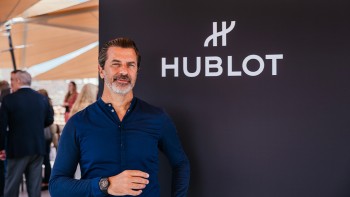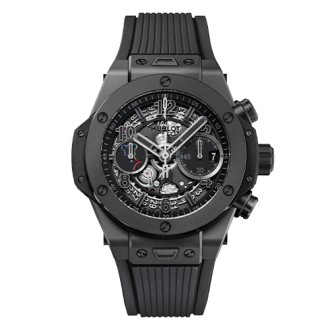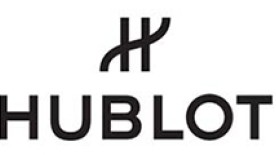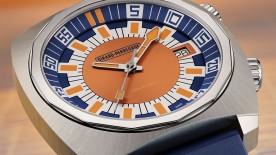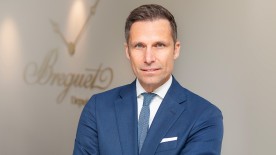Hublot is known for its many ambassadors that typically come from the worlds of sport and the arts. Whether its Kylian Mbappé, Novak Djokovic or Usain Bolt, or Takashi Murakami, Daniel Arsham or Depeche Mode, the Swiss watchmaker has a penchant for bringing on board friends of the brand that are at the top of their field.
One coterie of the Hublot family that has steadily grown over the past seven years is its roster of gastronomy ambassadors. Since the Nyon-based watchmaker partnered with three-Michelin-starred Swiss chef Andreas Caminada in 2017, the brand has teamed up with seven more culinary hotshots.
Recently, Hublot and Caminada joined forces again to create the Hublot Big Bang Unico All Black Schloss Schauenstein, a special limited edition made to celebrate the first 20 years of Caminada’s gourmet restaurant at Schloss Schauenstein in eastern Switzerland.
The pair chose to launch the dark-toned watch at a stylish rooftop gathering along the banks of the Limmat river in Zurich where we managed to sit down with Caminada to talk about the parallels that exist between succeeding in fine watchmaking and excelling at gourmet cuisine, fine dining and restaurateuring.

Andreas, both you and Hublot have experienced impressive growth over the past two decades. And within that time, you have both been credited with reinventing your respective crafts. Tell us about this journey…
I started my restaurant at Schloss Schauenstein in 2003 at the age of 26, and we had just four employees. Now we have about 70. During the first ten years, we focused solely on growing this restaurant. Then in 2015 we had the chance to be involved in a parallel project and to open the first IGNIV by Andreas Caminada restaurant. I realised that doing other projects can also help to energise the Schloss Schauenstein restaurant, our core activity. They help us to raise our game and take us to the next level.
Now we have the restaurant, we have bought the castle property and hotel, we have our IGNIV network of “nest” restaurants around the world, we publish our own magazine and we have exciting, groundbreaking partnerships with companies like Hublot.
Whatever the size of the company, I believe that to thrive you need to be dynamic – you can’t stand still. I think my wife – who has worked alongside me the past 12 years – and I, we both have this dynamism. When we consider trying something new, we make the decision pretty quickly and then it’s done. If you think something to death, you’ll never move forward.

In the Big Bang Unico All Black Schloss Schauenstein we see the use of Hublot’s own manufacture chronograph movement developed and produced in-house. How important is self-sufficiency – using produce grown in your grounds – for you?
It’s very important because it allows us to express our difference, be independent and ensure the high quality of our ingredients. In our garden, we planted a lot of seeds from different places to grow a diversity of vegetables and herbs, and we can experiment with them to make produce that you wouldn’t be able to order from a supplier. Our garden is like a playground – we can adjust, tweak, fine-tune, and it gives us so many possibilities.
For example, I walked through the garden and saw a radish which was perfectly nice and ready to take out. But we left it in the ground and then it became a plant that had shoots and you can eat these. That’s the beauty, sometimes you can just give things time and see what happens. And magic happens!
Another example is berries. You can pick them so they are more sour or less sour and that can open up the palette of tastes in a crazy way. If we didn’t have our garden, we wouldn’t be able to discover these nuances.

Community is a big part of watch collecting. Similarly, your restaurants have been described as more than just dining establishments; they are meeting places for socialising and community. How important is community for you and have you noticed any changes in that regard in the last decade?
I think good food has become an important part of people’s lives and has entered the public consciousness in a big way. Even before the last decade we already had celebrity chefs emerging on TV and that has made people think more about what they cook at home. Then COVID-19 happened and everybody had the time to cook for themselves at home again, maybe discovering old recipes or starting their own vegetable garden.
And now, more than ever, I sense that people like to discover new restaurants and share their experience with their friends – these things have become topics of daily conversation. Whatever the culture, from Mexico to Thailand to Switzerland, I think knowledge and appreciation of good cuisine is at an all-time high.

In Hublot’s press materials, it states that Schauenstein Castle is located in a “captivating setting that embodies the cherished 'Swissness Attitude' valued by Hublot”. What, for you, is “Swissness” and how does it manifest itself in your work?
It’s quite difficult to define a “Swiss” cuisine because it is divided into so many cantons and regions: There is not one Swiss cuisine. But I would say a common theme across the country is our quest for high quality as regards food and service, and in being able to repeat that quality day in day out – consistency. We Swiss, we’re not great at selling ourselves, but we go about our work diligently and discreetly.

A key component of watchmaking is the transmission of knowledge – passing on time-honoured savoir-faire to watchmakers of the future – and recognising and promoting young talent. Through your Uccellin Foundation, you are committed to the identification and promotion of cooking and service talent. Tell us about how important this topic is to you.
In 2015, my wife and I decided it was time to give something back by setting up an initiative that would help the industry, that gives young chefs and service talents a helping hand in their careers. So we established a scholarship programme whereby students from any country can spend up to six months working under and learning from our network of friends in the gastronomic world.
We assume the costs, all the restaurant or hotel has to do is host the student and pass on their knowledge to them. In 2016, we offered two scholarships, this year we offered 70. We do lots of fundraising events and the more money we raise, the more students we can put on the programme. The idea was to give something back, do something nobody had done before and create something that has a positive impact that could even outlast our restaurants.
To find out more about Andreas Caminada’s co-creation with Hublot – the Big Bang Unico All Black Schloss Schauenstein – please visit the Hublot website.

